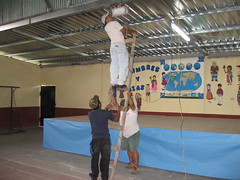Yesterday, I described how residents of San Diego County, who utilized the North County Times’ online discussion tools to call for and deliver needed news about conditions in their neighborhoods. It was a different kind of journalism that emerged out of a traditional journalism. It was resourceful and ruthless learning.
Another example occurs to me. I’ve written several times about using a chat program during my workshops and speeches to facilitate backchannel discussions among participants and audiences. This has worked remarkably well. One exception, however, occurred when three (one in particular) people monopolized the conversation with junk talk. Several members of the audience attempted to engage in conversations related to the presentation, but the effect of the abusers was a denial of access.
 |
| When I found this photo on Flickr, I considered changing the title of this blog to Resourceful, Ruthless, and Risky. |
Several of the teachers were so eager to engage in conversation that they pulled up Skype and started commenting on the presentation there. One even invited friends in from outside the venue, broadcast the audio of the presentation to them, and expanded the conversation even further. It was resourceful and ruthless learning.
Years ago, when my children were both in middle school, our house was the gathering place for most of the kids in the neighborhood, mostly older than our kids. My wife, Brenda, was especially open and hospitipal to the youngsters. It mostly irritated me, but several of them genuinely impressed me. Two boys, in particular. One was always talking about rock bands. He could discuss any band you might mention, give you the names of the members, the instruments they played, how they learned the instruments, the names of their parents, siblings, and girlfriends — and information I really didn’t want to know.
The other could talk about any movie you might be interested in, listing the cast and crew, and tell captivating anecdotes about the making of the movies. Both were obviously resourceful and ruthless learners.
In each of these instances, the learners engaged in responsive conversations, communicating from a sense of personal experience. They worked in casual communities where they could ask questions, answer questions, and illustrate their accomplishments. The invested themselves outside traditional boundaries of learning, where they could safely make mistakes and still earn attention.
Both of those resourceful and ruthless learners in my neighborhood were diagnosed with Attention Deficit Disorder — one with ADHD. Both dropped out of high school.
Image Citation:
Young, Rich. “Escuela Adventista Central America Cultural Event 020.” Young in Panama’s Photostream. 25 Sep 2006. 30 Oct 2007 <http://flickr.com/photos/young-in-panama/252072452/>.

I think that there will be more and more students like these two learners in the future. As more and more schools jump through the NCLB hoops desperately trying to get off the “list”, our schools will continue to lose more students who are genuinely interested in learning, but not necessarily interested in what we want to teach them.
I think Michael Wesch’s A Vision of Students Today demonstrates the widening gap of schools and teaching versus the reality of today’s students learning lives.
How many teachers would allow backchanneling in their classrooms? How many of the teachers who have enjoyed the backchannel in your presentations allow it in their classroom? It’s time that we embrace the possibilities that these technologies provide and not just dismiss them as things that our children are too immature to handle. They can do it. The bigger question is whether we can.
Thanks Mike. You say that we will have more and more, “students who are genuinely interested in learning, but not necessarily interested in what we want to teach them.”
I think that they may not be so interested in being taught. These kids were satisfied to teach themselves. Talented teachers, I believe, can facilitate this kind of on-demand self-teaching in a way that it envelops important and useful learning.
Also, to be fair, I’ve had lots of teachers come up to me, after these sessions, and ask how they can set up this sort of backchannel conversations in their classes.
I think Dave with some of his recetn posts brings up the deeper question– “What is the purpose of school?”. Do we wish to create well rounded students who get a sampling of multiple subjects and content in order to make them more “worldly” or do we allow them to be mostly self directed where they can be “ruthless” in their quest to explore video games, rock bands, or baseball.
Dave, you cited that both students above dropped out, which is a tragedy.
Is it a bigger tragedy to have a student say “graduate” with twelve years of school in which they are incredibly well versed in say, batting averages, on base percentages, and who bats lefty while lacking skills in world language, knowledge of the US Constitution, the pythagorean theorem, and the periodic table?
Barry
I think it’s more of a question of how can we direct or harness those sorts of learners. How do we hook them? Do we make them the resource? Do we help them figure out how they learn so deeply so they can transfer that methodology?
btw, my 7yo son is like this wrt dinosaurs, airplanes, and helicopters. He is fascinated with Guiness Books of World Records. He is adhd and his kindergarten teacher told me ftf that he was a little monster.